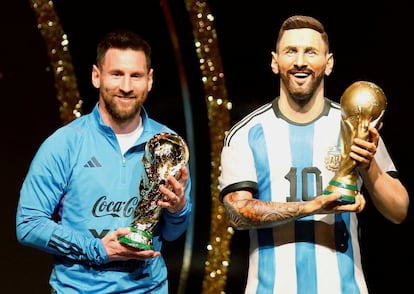Lionel Messi emerges from Maradona’s shadow as idol of the masses in Argentina
Soccer fans have been tracking the PSG forward across Buenos Aires after Argentina’s World Cup win, now praising him with the same fanaticism as they previously criticized him


Corrientes Avenue is Buenos Aires’ theater land. Last Saturday evening, a crowd gathered outside the Lola Membrives Theater. When it seemed as though the situation was in danger of becoming uncontrollable, a giant screen advertising a new production of Tootsie suddenly went blank. When it came back on seconds later, a huge message was displayed: “Lionel Messi is not in the theater.” A rumor had gone around that the captain of the Argentina national soccer team was among the audience and a horde descended, one that has been chasing Messi around the city for a week. Many of them would have been among those who described the PSG star as a pecho frío until Argentina lifted the Copa América in 2021. Now, at 35, Messi is finally idolized by soccer fans in a soccer mad country, installed on the same pedestal as the great Diego Maradona.
Argentineans used the term pecho frío to describe a player viewed as fainthearted, a sleepwalker who only takes to the field for money, who does not feel the passion of the shirt or share the fans’ hunger for glory. For many years, Messi was vilified for failing to replicate the genius he so regularly displayed for Barcelona when playing for his country. In 2018, after Argentina lost a third consecutive major tournament final, Messi complained in an interview with TyC Sport that Argentinean fans did not recognize the effort and sacrifice of the players. “In any other country in the world, a player getting to three finals would be appreciated, but not us. In Argentina they call us chickenshit or pecho frío.” Argentina’s disappointing 2018 World Cup, where they were beaten by eventual champions France in the last 16, opened the schism between Messi and the fans even further. When Argentina played at home, stadiums would erupt in chants of “Maradona, Maradona” and the legendary number 10 was worshipped on television sports programs and in the media, despite his tendency to drift in and out of games depending on his mood.
In 2021, everything changed. Argentina beat arch-rivals Brazil in the Maracanã to win the Copa América, Messi’s first major international trophy. Then came the World Cup in Qatar, where the diminutive attacker led Argentina to triumph, precisely over France, despite the best efforts of Kylian Mbappé. Finally, Messi had lifted the curse. With the World Cup to his name, the comparisons with Maradona, who carried Argentina to glory in 1986, were no longer relevant. Last Thursday, 85,000 people gave Messi a standing ovation at River Plate’s Monumental stadium during a friendly game against Panama. Messi took the microphone and addressed the crowd, once again asking for recognition for those who had come before him.
Argentina honor Leo Messi after reaching 100 goals for his country 🇦🇷
— B/R Football (@brfootball) March 29, 2023
(via @TyCSports)pic.twitter.com/CQxGU1q1ml
“I want to thank you for all the love we are receiving, not just for winning the World Cup but from before, when we won the Copa América. I know that today is our day, but I don’t want to forget all those colleagues I had before, who also did everything possible to get this one, and unfortunately it didn’t happen for us, although we were very close,” Messi said. “They also deserve respect and recognition.”
Messi usually returns to his native city, Rosario, when Argentina are playing but on this occasion he elected to stay in Buenos Aires, where he has been seen around the capital with friends, his wife Antonella Rocuzzo, dancing with his teammates and greeting fans with a smile. On the streets of Buenos Aires, Messi was more like a teenager who has suddenly discovered the pleasure of fame than the veteran who is sick of its trappings. He signed autographs without a fuss and even rolled down the window of his car to greet a family who had recognized him on the highway. On Sunday, the Argentina Football Association named a new sports complex at its headquarters in Ezeiza, on the outskirts of Buenos Aires, in honor of Lionel Andrés Messi.
Two days later, Argentina hosted Curacao in the final friendly of the international break, the final stop on the celebratory tour of the World Cup winners on their home turf. Messi scored a hat-trick to take his tally of international goals to 102, becoming just the third player in history to reach that mark, after Cristiano Ronaldo and Ali Daei. Argentina’s 7-0 win also took them to top of the FIFA ranking as the holder of three concurrent titles (the World Cup, the Copa América and the CONMEBOL-UEFA Cup of Champions). Only Brazil and France had achieved that feat previously.
Sign up for our weekly newsletter to get more English-language news coverage from EL PAÍS USA Edition
Tu suscripción se está usando en otro dispositivo
¿Quieres añadir otro usuario a tu suscripción?
Si continúas leyendo en este dispositivo, no se podrá leer en el otro.
FlechaTu suscripción se está usando en otro dispositivo y solo puedes acceder a EL PAÍS desde un dispositivo a la vez.
Si quieres compartir tu cuenta, cambia tu suscripción a la modalidad Premium, así podrás añadir otro usuario. Cada uno accederá con su propia cuenta de email, lo que os permitirá personalizar vuestra experiencia en EL PAÍS.
¿Tienes una suscripción de empresa? Accede aquí para contratar más cuentas.
En el caso de no saber quién está usando tu cuenta, te recomendamos cambiar tu contraseña aquí.
Si decides continuar compartiendo tu cuenta, este mensaje se mostrará en tu dispositivo y en el de la otra persona que está usando tu cuenta de forma indefinida, afectando a tu experiencia de lectura. Puedes consultar aquí los términos y condiciones de la suscripción digital.








































